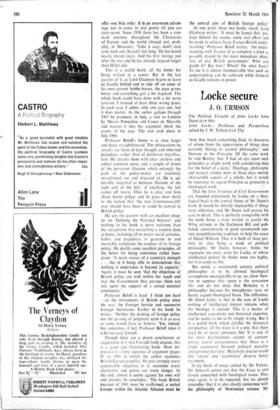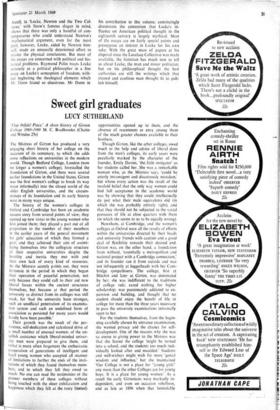The Political Thought of John Locke John Dunn (cut. 60s)
Locke secure
J. 0. URMSON
The Political Thought of John Locke John Dunn (cut. 60s)
John Locke : Problems and Perspectives edited by J. W. Yolton (cup 55s)
'And thus much concerning God, to discourse of whom from the appearances of things dOes certainly belong to natural philosophy,'said Newton in the Principia. Of the same work he told Bentley that 'I had an eye upon such principles as might work with considering men for the belief of a deity.' Theology, philosophy and natural science were in those days merely abstractable aspects of a whole; but it wield be excessive to regard Principia as primatily- a theological work.
That the Two Treatises of Civil Government are founded consciously by Locke on a 'firteet- logical basis is the central theme of Mr Dutin's book. It would be initially implausible if thihgs were otherwise, and Mr Dunn well proveg'hii case in detail. This is perfectly compatible-With the work being a tract written to justify. the Whig attitude to the Exclusion Bill and
lished, anonymously in good seventeenth cert. tury pamphleteering tradition, to help the cause of Dutch William. That it is both of these'per- mits its also being a work of political philosophy; Mr Dunn, however, thinks' the argument too poor, even for Locke, of whose intellectual powers he thinks none too highly, for it to count as this.
But surely a seventeenth century political philosopher is to be allowed theological assumptions unacceptable to us; we allow New- ton to suppose that space is the sensorium Dei and do not deny that Berkeley is a philosopher because his metaphysics rests on barely argued theological bases. The difference, Mr Dunn holds, is that in the case of Locke nothing of intellectual interest remains when the theology is excised. This is a matter of intellectual assessment, not historical expertise, and he seems to me to be simply wrong. But it is a useful book which clarifies the historical perspective; all the more is it a pity that there must be so many sentences like 'it is one of the most platitudinous axioms of contem' porary moral consciousness that there is a crude asymmetry between political morality' and personal morality.'-Relatively precist.words: like 'axiom' and 'asymmetry' deserve better treatrnent.
In the book of essays edited by Mr Yolton, Mr Ashcraft points out that the Essay is also' closely concerned with theological issues. This,' once again, is to be expected; but we shoufdl remember that it is also closely concerned with the philosophy of Newtonian science. Mr Axtell, in 'Locke, Newton and the Two Cul- tures,' with Snow's famous slogan in mind, shows that there was only a handful of con- temporaries who could understand Newton's mathematical argument, even for the most part; however, Locke, aided by Newton him- self, made an unusually determined effort to master the physical conclusions. But most of the essays are concerned with political and his- torical problems. Raymond Polin treats Locke seriously as a political philosopher in a fine essay on Locke's conception of freedom, with- out neglecting the theological elements which Mr Dunn found so disastrous. Mr Dunn in
his contribution to this volume, convincingly documents the contention that Locke's in- fluence on American political thought in the eighteenth century is largely mythical. Most of the essays are on fairly special points and presuppose an interest in Locke for his own sake. With the great mass of papers at his disposal since the Lovelace Collection was made available, the historian has much new to tell us about Locke, the man and minor politician; but on his philosophical thought the best authorities are still 'the writings which that shrewd and cautious man Thought fit to pub- lish himself.











































 Previous page
Previous page